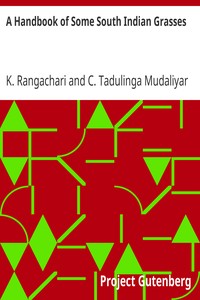A Handbook of Some South Indian Grasses by K. Rangachari and C. Tadulinga Mudaliyar
"A Handbook of Some South Indian Grasses" by K. Rangachari and C. Tadulinga Mudaliyar is a scientific publication written in the early 20th century. This work serves as a guide to the study of various grasses prevalent in the plains of South India, detailing approximately one hundred species that are essential for agriculture and livestock. The handbook emphasizes the economic significance of grasses, often overlooked by farmers, and aims to enhance knowledge
for better agricultural practices. The opening of the handbook introduces the wide distribution and vital ecological role of grasses around the world. It explains how grasses can adapt to various soil types and climates and stresses their importance in agriculture, particularly for cattle welfare. The text highlights the general characteristics and vegetative structure of grasses, discussing various types through the example of specific species, such as "Panicum javanicum". The author points out that while grasses form a crucial element of farming, they are often neglected, resulting in a need for detailed identification and understanding as agricultural practices evolve with changing demographics and land use. (This is an automatically generated summary.)
Read now or download (free!)
| Choose how to read this book | Url | Size | ||||
|---|---|---|---|---|---|---|
| Read online (web) | https://www.gutenberg.org/ebooks/24063.html.images | 566 kB | ||||
| EPUB3 (E-readers incl. Send-to-Kindle) | https://www.gutenberg.org/ebooks/24063.epub3.images | 8.1 MB | ||||
| EPUB (older E-readers) | https://www.gutenberg.org/ebooks/24063.epub.images | 8.1 MB | ||||
| EPUB (no images, older E-readers) | https://www.gutenberg.org/ebooks/24063.epub.noimages | 234 kB | ||||
| Kindle | https://www.gutenberg.org/ebooks/24063.kf8.images | 8.4 MB | ||||
| older Kindles | https://www.gutenberg.org/ebooks/24063.kindle.images | 8.4 MB | ||||
| Plain Text UTF-8 | https://www.gutenberg.org/ebooks/24063.txt.utf-8 | 443 kB | ||||
| Download HTML (zip) | https://www.gutenberg.org/cache/epub/24063/pg24063-h.zip | 7.9 MB | ||||
| There may be more files related to this item. | ||||||
Similar Books
About this eBook
| Author | Rangachari, K. |
|---|---|
| Author | Tadulinga Mudaliyar, C. |
| Title | A Handbook of Some South Indian Grasses |
| Note | Reading ease score: 73.0 (7th grade). Fairly easy to read. |
| Credits |
Produced by Suzanne Lybarger, John Hagerson, Juliet Sutherland, Leonard Johnson and the Online Distributed Proofreading Team at http://www.pgdp.net (This file was produced from images generously made available by The Internet Archive/Million Book Project) |
| Language | English |
| LoC Class | QK: Science: Botany |
| Subject | Grasses -- India, South |
| Subject | Plants -- India, South |
| Category | Text |
| EBook-No. | 24063 |
| Release Date | Dec 28, 2007 |
| Copyright Status | Public domain in the USA. |
| Downloads | 212 downloads in the last 30 days. |
| Project Gutenberg eBooks are always free! | |

